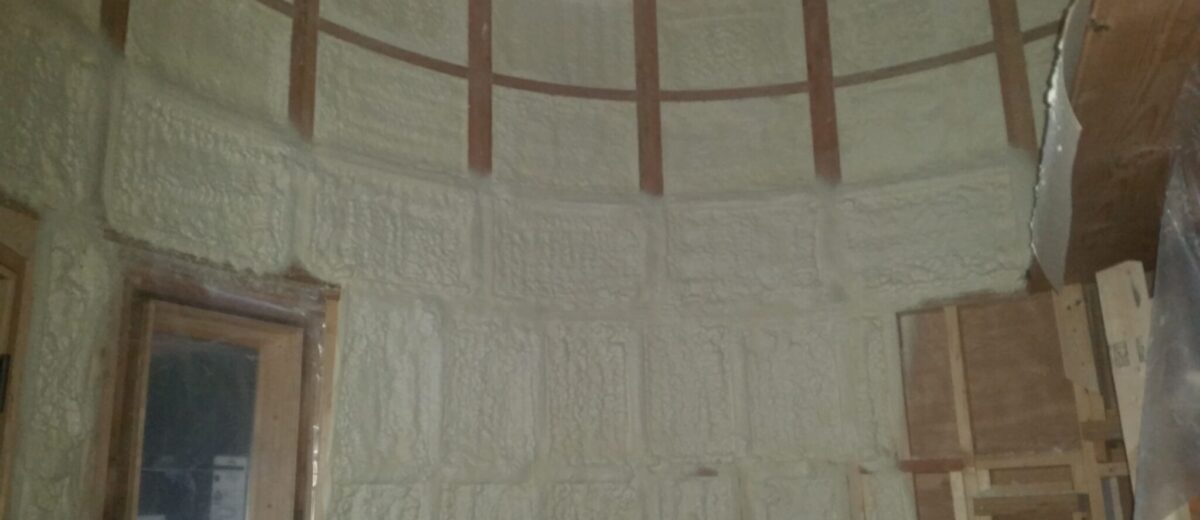Durable Spray Foam to Increase the Life of Your Home & Building
We offer residential and commercial spray foam insulation services in Maine. With one of the most advanced spray foam solutions in Maine, Foam Pro Inc offers customers superior services they know they can rely on.
In fact, our spray foam provides nearly twice the value of traditional insulation. The dense polyurethane and polyethane insulation we use is extremely durable and will expand and fully adhere to surfaces, strengthening the structure of a home.
Our insulation provides incredible thermal performance and can be installed in areas that would be inaccessible or difficult for other forms of insulation. It effectively isolates air currents and moisture, reducing the chance of mold or mildew and increasing the life of any building.
Why Spray Foam Insulation?
Spray foam:
- Offers higher insulation ‘R’ value than traditional fiberglass
- Provides a seamless air barrier
- Restricts moisture transmission
- Adds structural strength
- Minimizes sound transmission
What is Spray Foam Insulation?
Spray foam insulation is a process that fills cavities against air leakage and moment. In the home there are many locations which air can move and leak, causing heat loss and lower heating and cooling efficiency. This includes sealing wall, ceilings and floors as well as areas around electrical outlets and light fixtures. Unlike rolled and sprayed fiberglass, spray foam fills cracks, gaps and crevices on installation. It won’t settle, compress or sag as it ages.
How Does Spray Foam Insulation Lower My Home’s Energy Cost?
According to the US Department of Energy, air leakage can account for as much as 40 percent of the energy cost to heat and cool your home. That is the equivalent of leaving a window open 24 hours a day, all year long. Spray foam insulation is the most effective protection against this significant source of leakage.
How Spray Foam Insulation Works
(Reference: https://www.spraypolyurethane.org/spf-insulation-basics/)
SPF, a spray-applied cellular plastic, is made by mixing chemicals to create foam. Those chemicals react very quickly, expanding on contact to create foam that insulates, air seals and provides a moisture barrier. When properly installed, SPF forms a continuous barrier on walls, around corners and on contoured surfaces. It resists heat transfer very well and is an effective solution for reducing unwanted air infiltration through cracks, seams, and joints.
SPF insulation applied by professionals is usually described as either a high- or low-pressure foam and is available as either open- or closed-cell. Each type has advantages and disadvantages depending on the application requirements. The comparison chart below can be helpful in explaining or understanding which type of SPF insulation is best suited to a specific application.
Closed-Cell vs Open-Cell Foam: A Comparison
Closed Cell
- Higher R-value (greater than 6.0 per inch)
- High moisture barrier (lower moisture permeability)
- Air barrier
- Higher strength and rigidity
- Resists water
- Medium density (1.75 — 2.25 lbs./ft3)
- Absorbs sound
Open Cell
- R-value (approximately 3.5 per inch)
- Lower moisture barrier (higher moisture permeability)
- Air barrier at full wall thickness
- Lower strength and rigidity
- Not suggested for applications in direct contact with water
- Lower density (0.4 — 1.2 lbs./ft3)
- Absorbs sound very well
Cost Savings with Spray Foam Insulation
In Maine, a house with 1,800 square feet of living space can save $447/year on average using a spray foam insulation/air barrier when compared to standard rolled fiberglass insulation.
Start Planning Your Savings Today with Spray Foam Insulation!
Contact Foam Pro Inc today for a free spray foam insulation cost estimate.
